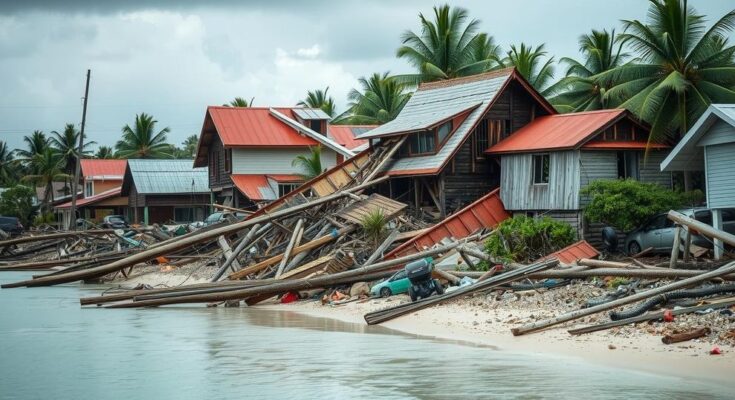Cyclone Chido has severely impacted Mayotte, potentially resulting in a death toll of several hundred to thousands. Officials confirmed at least 11 fatalities and extensive damage across the island. France has deployed rescue teams and resources to assist in recovery efforts. The cyclone’s intensity raises concerns about the effects of climate change on vulnerable populations in the region.
Cyclone Chido has wreaked devastating havoc on the French overseas territory of Mayotte, with the death toll being reported as potentially reaching several hundred, and possibly into the thousands, according to Mayotte’s government officials. As rescue teams mobilize to aid the heavily impacted region, initial reports confirmed at least 11 fatalities and over 250 injuries, though these numbers are expected to rise significantly due to the cyclone’s extreme severity.
The cyclone, classified as Category 4 with winds surpassing 220 kph (approximately 136 mph), made landfall on Friday and Saturday. The resultant destruction primarily affected the impoverished neighborhoods characterized by informal structures, which were particularly vulnerable. Mayotte’s Prefect, François-Xavier Bieuville, remarked on the difficulty in accurately assessing the damage and casualties, emphasizing that the initial death toll underrepresents the true situation in the island’s slums and informal settlements. France has responded swiftly, deploying rescue personnel and supplies to the area, amidst concerns for the welfare of the local population.
In addition to Mayotte, Cyclone Chido proceeded to impact nearby regions, including Comoros and Madagascar, before making its way to northern Mozambique, prompting fears of further humanitarian crises in these areas. The cyclone season in this region typically spans from December to March, and the recurrence of such disasters raises important discussions regarding climate change and its exacerbating effects on vulnerable regions.
Cyclone Chido, which recently struck Mayotte, is one of the most significant natural disasters to impact the region in decades. Mayotte, a relatively impoverished French territory in the Indian Ocean, has a population of over 300,000 residents, many of whom live in informal housing that is particularly susceptible to severe weather events. The recent cyclone has been characterized as the worst to hit the region in 90 years, reflecting a troubling trend as climate change intensifies the frequency and magnitude of such storms. The French government has been mobilizing resources, including personnel and supplies, to mitigate the suffering of the affected population and restore critical infrastructure.
In conclusion, Cyclone Chido’s impact on Mayotte has resulted in a catastrophic situation, with the death toll likely far exceeding initial estimates. The extensive damage to homes and infrastructure highlights the vulnerabilities faced by regions like Mayotte, which grapple with poverty and inadequate housing. As rescue efforts progress, the necessity for international support and attention to the impacts of climate change on such vulnerable territories becomes acutely evident. The immediate focus remains on providing humanitarian aid and restoring essential services to the residents of Mayotte.
Original Source: apnews.com




